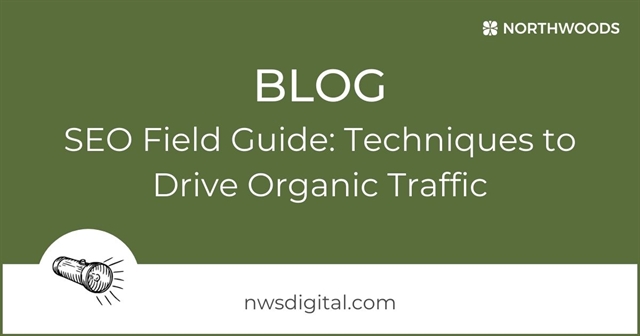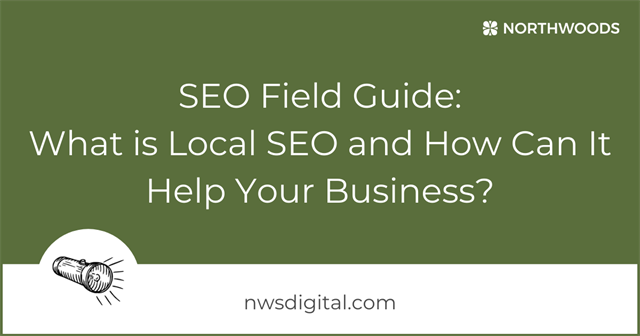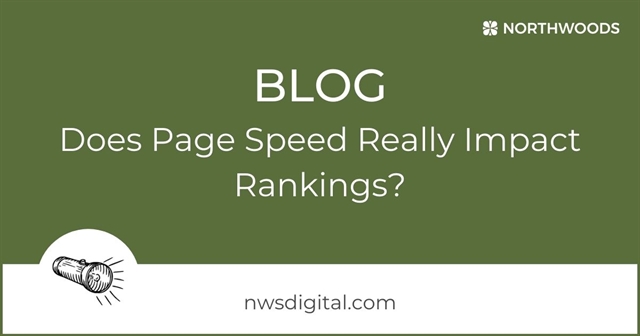By Northwoods Team
January 3, 2022
8 Minute Read
SEO. Search Engine Optimization. Everyone talks about it, but what exactly is it?
In short, SEO is the process of following best practices to rank high on search engine results pages organically (that is, without paying for it).
But what exactly do we mean by best practices? What basic SEO guidelines should you follow?
Consider this article a primer for the uninitiated, a back-to-basics refresher for those in the know, and a gap filler for those who kinda-sorta know a bit about SEO. You’ll come out the other side armed with better understanding of SEO and some tips for improving your website’s organic rankings.
SEO Basics for Beginners and Beyond
Good content and a solid understanding of SEO are crucial partners for website success. Good SEO can’t save a site with bad content. Good content can’t reach its audience if the SEO is poor. Both must evolve as audience wants and needs change with the market and search engines grow ever more sophisticated in their endless quest to better serve their users.
Why Is SEO Important?
- SEO keeps search results fair. Google caters to the user; it wants to deliver the most useful results. To do that, Google needs to understand your content and your website’s purpose. Think about what your business offers customers and what problems your products or services solve. Generate content that relates to those problems and your solutions. Determine your target audience and aim your content and SEO at that audience.
- Users trust search engines. If you’re at the top of search results, users will trust you. The higher you rank, the higher the click-through rate, the more traffic to your site. SEO is part of the user experience. If you’re easy to find and satisfy customers during their visits, they’ll come back.
- SEO is cost-effective. Businesses spend a lot for paid advertising. That’s great if you have the budget. If you don’t, SEO can generate quality traffic at no cost beyond employee time.
A Few Words About SEO Charlatans and Scoundrels
Many businesses struggle to attract quality organic traffic to their sites. The internet being the internet, misinformation about how to do that abounds online. Don’t trust just anyone on this important topic.
Take special care not be misled into the netherworld of Black Hat SEO, with its click-bait headings, keyword stuffing, and other deceptive practices. Ethical issues aside, those tactics just don’t work well these days. They won’t attract the right audiences, and Google is good at hunting down and punishing offenders.
Consult only with genuine experts as you strive to increase website traffic organically, ethically and productively.
What Strategies Should You Use to Drive Traffic?
Start with keyword research.
To generate content your target audiences want and need, find out how they search. Software such as SEMrush, Moz, Ahrefs, and Google Keyword Planner will give you keyword results with monthly search volume.
Once you’ve determined your target keywords, incorporate them into your content. Do so strategically but naturally. The old black-hat strategies of stuffing keywords into content (sometimes to the point of turning content into gibberish) or placing hidden text are obsolete.
The keyword tools mentioned above can show what keywords your competitors are using, how often people search for those terms, how expensive they are for pay-per-click, and they can point you toward related keywords.
Again, SEO is pointless without useful content. That content must share your expertise and build confidence that your business – sometimes through your content alone – can solve user problems. When your business goals and solutions align with keyword strategy and shine through your content, Google will recognize that and reward you with higher ranking.
The Complexity of Google’s Algorithm
Google’s algorithm changes frequently, and we digital marketers must keep up. Google caters to the user, not to your business goals. You must show Google that you are worthy – that you give its audience good stuff. An impressive domain authority score helps.
Moz originally developed the domain authority search engine ranking score. The search engines rate you directly, from 0 (bad) to 100 (perfect). You can get at that rating through sites such as Moz, Ahrefs, or SEMrush.
How do you raise your domain authority score? Invest time in content and build internal and external links. Internal linking involves connecting pages, especially the most important pages, within your site. This helps Google understand the hierarchy of your site.
This does not mean linking every single page of your website to, say, your product page.
Link internally in natural ways. Make it easy for users to reach your most important pages. For example, if you have a blog that focuses on new product releases or industry trends, link to related articles published on your site. Such links serve as UX-enhancing navigation tools, which also help Google understand your website hierarchy.
External links, both inbound and outbound, connect to websites outside of your domain. Relevant outbound links tell Google that you genuinely want to help users get information they need. When an external site links to you, Google see it as an endorsement.
However, monitor websites that link to you. If a spam site with a low domain authority links to you, your domain authority will sink and, ultimately, your organic rankings will sink, too. Google doesn’t want you hanging out with the wrong crowd.
Know the Technical Side
Technical SEO helps search engines crawl and index your site more effectively, which improves your organic rankings. Many components help with the security and structure of your website.
Have a Mobile Friendly Website
A responsive, mobile-friendly website adjusts automatically for good display and navigation on tablets and cell phones. Google algorithms weigh such responsiveness as a website ranking factor. Google introduced its mobile-first approach for indexing content back in 2018. Google now crawls mobile versions, not desktops, for indexing and ranking.
Check Your Website’s Speed
Search engines favor sites that load pages fast. Page speed is a Google ranking factor. Use tools such as PageSpeed Insights and Lighthouse to check for speed issues. You can speed up loading by:
- Minimizing your site’s code.
- Removing unused CSS or JavaScript code.
- Removing unused third-party code.
- Improving server response time.
- Optimizing images.
- Leveraging browser caching.
Check for Duplicate Content Issues
Content duplicated on multiple URLs within your site can confuse both users and search engines. In the past, Black Hats used it to manipulate search rankings and generate more traffic. Search engines don’t like it. Fix duplicate content issues by:
- Redirecting content to the canonical URL.
- Adding a canonical link element to the duplicate page.
- Not creating duplicate content in the first place.
- Adding an HTML link from the duplicate page to the canonical page.
Have an XML Sitemap
An XML sitemap helps search engines understand your website as the search engine crawlers traverse it. The sitemap also contains such useful information as when a page was modified, its priority on your site, and its update frequency. You want Google to crawl every essential page on your website, and a sitemap speeds up content discovery.
Add Structured Data Markup
Structured data markup is code you add to your website to help search engines understand your content. Structured data markup types include:
- Article
- Recipe
- Event
- Local Business
- Product
- FAQ Page
- Job Posting
- Breadcrumb
- Person
- Review
Many more exist. Each markup is specific to a type of content. Think of structured data as a search engine language. (For more information on structured data and how to use it, check out Understand How Structured Data Works.)
Structured data also enhances search results. It adds “rich snippets,” such as star ratings, product prices, and review information:

Rich snippets enhance the visual appeal of the search result for the user. They increase click-through rates and drive more traffic to your website.
Check Your Meta Descriptions
Meta descriptions – the blurbs below the search results link – are no longer ranking factors. But they’re great for user experience.

Meta descriptions display in bold type the keywords users type in their search queries. I Googled “how to bake a pie.” In the above example, my search terms – bake and pie – show in bold, along with the closely related baking, show in bold. This gives the user confidence that this search result is relevant. It’s good UX, especially within a compelling meta description. It can drive click-throughs and further lift your organic search results.
Register Your Site on Google Search Console and Bing Webmaster Tools
Google Search Console and Bing Webmaster Tools are free from Google and Microsoft. They allow you to submit your website to their search engines for indexing. When you launch your website, you should submit your XML sitemap to both. Then they can crawl your website effectively to display results on their search results pages.
These tools track your performance, mobile usability, site coverage, and any issues on your site. Through them, you can monitor and resolve server errors to make sure your website is performing as it should.
Use SSL
SSL means Secure Sockets Layer. This security protocol creates an encrypted link between the web server and the web browser. Websites need to add SSL certification to secure online transactions and customer information. Your website will function normally without SSL, but it will be vulnerable to hackers and Google will warn users your site isn’t secure.
A secure site will make your visitors feel comfortable as they browse your pages and purchase goods and services. When users feel at risk, they leave your site and your organic rankings drop. Google has made security its top priority; HTTPS is a google ranking factor.
Conclusion
SEO is a complex practice for raising the quantity and improving the quality of website traffic. SEO communicates with search engine crawlers and helps them better understand your website. Google’s end purpose: Helping searchers find useful answers and solutions. Without good SEO, your rankings will drop and you’ll miss opportunities to generate traffic, leads and sales.
The digital world is ever-changing. If you’re struggling to stay on top of SEO or can’t dedicate time to it, Northwoods is here to help.
Contact us here and subscribe to our blog emails to keep up with the latest digital marketing trends.
Related Blog Posts

Increasing your site's organic traffic is not easy and does not happen overnight. It takes time and effort to see long-lasting results. If you need guidance or help to improve your site's visibility, traffic, and overall digital presence, follow these tips.

Optimizing your website for local searches - those made in the state, city, town, or even neighborhood where you attract and serve customers or clients - can be extremely beneficial for many businesses. As with real estate, local search is all about location, location, location! Here's how to optimize your site to drive more local business.

When it comes to websites, users want both content and functionality - and they want them fast. Google understands this need for speed, considering it one of three elements that make up its Core Web Vitals. But just how much of a role does site speed really play in your rankings?